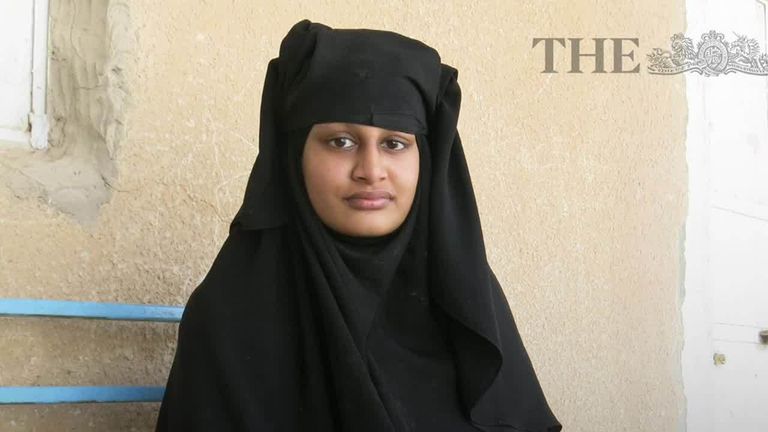Subject: FW: A different audience, a different time.
As the pace of the argument picks up regarding Savid Javid decision to revoke Shamimea Begum's right to return to this country following her stint in Syria as part of IS, the question of law and her right to the legal protection of a citizen born in this country is being hotly debated.
When a war is declared against another country the allegiance to ones own country is defined. If a person changes side and goes to fight alongside the enemy, then under the rules of war that person, if captured can face the firing squad.
In terms of a ill defined conflict such as terrorism where the combatants can not be defined as nationals then a whole new ball game comes into play. The definition of terrorism :- the unlawful use of violence especially against civilians in pursue of political aims, is not a unilateral war.
The argument that the society, particularly the family plays some part in the radicalisation of a person has to be accepted and, depending on the society and its dealings with the subset of that society, a form of radicalisation is bound to take place.
This phenomena reflects the diversity of a society where newcomers bring their cultural norms and their unique history. The tightness of the religious continuity which we know as Muslim, its historical story line of conquest and suppression, its confrontation with Christianity and Judaism over the ages means that it sits for some as an uncomfortable bed fellow in terms of a cultural fit.
The stories told in the mosque, reinforced at home and in the Muslim community can sow the seed of not belonging, of finding fault in the country you now reside in.
If the Caliphate had been about creating some sort of religious homeland, much as the Israelites have done then there would be no harm but if the gathering sows the seed of revenge, then a line is crossed. The question, should she be allowed back over the line given that she obviously still holds the discontent for this country (other than the facilities that the NHS offers her) which she had when she went away to join IS, then her need to be here is purely mercenary.
This raises the question of what constitutes a citizen. There are many countries who would treat very harshly someone thought to be disloyal, but in this country these countries are thought to be lacking in the ethics. The conundrum of risking ourselves in the pursuit of the ethical high ground is littered with the dead and dying who become the collateral damage of our high principles.
It takes courage to say no as Sajid Javid has done, risking the shriek of armchair pundits like myself and constitutional experts who berate any deviance from the statute book even if it was written for a far different audience.
The argument that the society, particularly the family plays some part in the radicalisation of a person has to be accepted and, depending on the society and its dealings with the subset of that society, a form of radicalisation is bound to take place.
This phenomena reflects the diversity of a society where newcomers bring their cultural norms and their unique history. The tightness of the religious continuity which we know as Muslim, its historical story line of conquest and suppression, its confrontation with Christianity and Judaism over the ages means that it sits for some as an uncomfortable bed fellow in terms of a cultural fit.
The stories told in the mosque, reinforced at home and in the Muslim community can sow the seed of not belonging, of finding fault in the country you now reside in.
If the Caliphate had been about creating some sort of religious homeland, much as the Israelites have done then there would be no harm but if the gathering sows the seed of revenge, then a line is crossed. The question, should she be allowed back over the line given that she obviously still holds the discontent for this country (other than the facilities that the NHS offers her) which she had when she went away to join IS, then her need to be here is purely mercenary.
This raises the question of what constitutes a citizen. There are many countries who would treat very harshly someone thought to be disloyal, but in this country these countries are thought to be lacking in the ethics. The conundrum of risking ourselves in the pursuit of the ethical high ground is littered with the dead and dying who become the collateral damage of our high principles.
It takes courage to say no as Sajid Javid has done, risking the shriek of armchair pundits like myself and constitutional experts who berate any deviance from the statute book even if it was written for a far different audience.

No comments:
Post a Comment